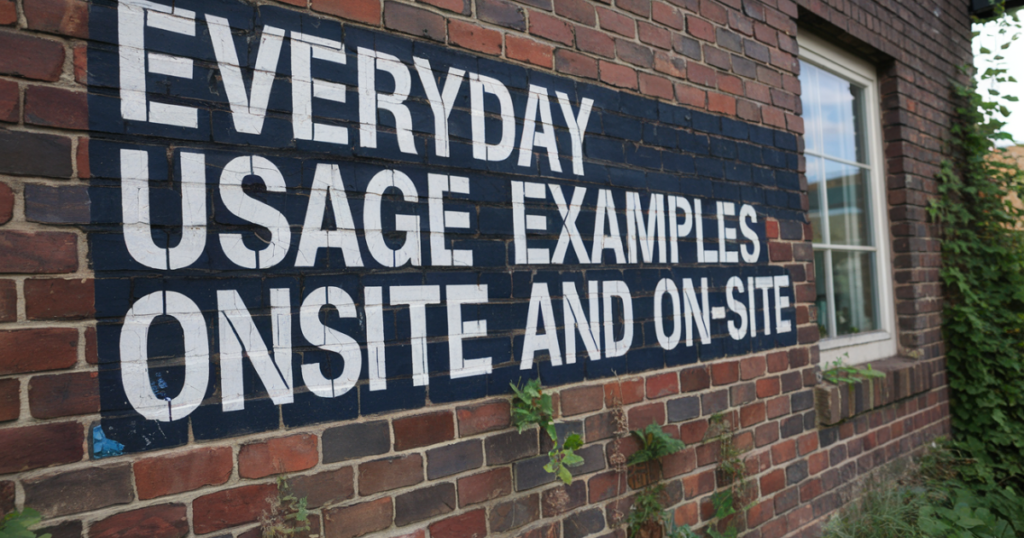When it comes to writing, even the smallest details can make a big difference, and this is especially true when it comes to the terms “onsite or on-site.” While both versions seem nearly identical, their usage can vary depending on context and style preferences. Understanding the difference between “onsite” and “on-site” can help ensure clarity and consistency in your writing, particularly in professional and technical settings.
“Onsite” is commonly used as an adjective to describe services or events that occur at a specific location, such as “onsite support” or “onsite meetings.” On the other hand, “on-site,” with a hyphen, is typically considered the more traditional form and can also be used as an adjective or adverb.
Understanding Onsite And On-Site

Onsite: Definition and Usage
“Onsite” refers to services, activities, or events that take place at a specific location, typically where business or operations are carried out. It is often used as an adjective to describe tasks performed at the client’s location or a designated venue.
Examples:
- The IT team provided onsite support to resolve the server issue.
- We will conduct an onsite training session at the corporate office next week.
Overall, “onsite” emphasizes the physical presence or performance of duties at a specific location, often contrasting with remote or offsite work.
You Like To Read This: Of Course Or Off Course: Which One Should You Use?
On-site: Definition and Usage
“On-site” refers to tasks, services, or events occurring at a designated location, with the hyphen emphasizing its role as a compound adjective or adverb. It highlights the importance of physical presence at a specific site for carrying out activities.
Examples:
- The technician provided on-site repairs to fix the malfunctioning equipment.
- We offer on-site inspections to ensure compliance with safety standards.
In summary, “on-site” is commonly used in both professional and technical contexts to clearly indicate that something is happening at a particular location, often in contrast to off-site or remote services.
Side-by-Side Comparison
This comparison will help you understand which word to select based on your writing style and context in English.
| Aspect | Onsite | On-site |
| Definition | Activities, services, or tasks at a location | Events or tasks occurring at a designated place |
| Hyphen Usage | No hyphen, used as a single word | Hyphenated, typically used as a compound adjective or adverb |
| Context | More common in informal or modern writing | Often seen in formal or traditional writing |
| Grammatical Role | Usually an adjective | Can be both an adjective and adverb |
| Examples | “The IT team offers onsite support.” | “We offer on-site inspections for clients.” |
We can say, “onsite” and “on-site” are nearly identical in meaning, but their usage varies slightly. “Onsite” tends to be used in more informal contexts or within modern language, while “on-site” maintains traditional and formal appeal.
Knowing when to use each form can help ensure consistency and professionalism in your writing. Both terms emphasize the importance of physical presence at a location, with only minor distinctions in style.
Everyday Usage Examples

Onsite Examples:
- The company provides onsite customer service for premium clients.
- We offer onsite catering for corporate events.
- The onsite gym is open to all employees.
- Our team offers onsite technical support for your equipment.
On-site Examples:
- The engineer performed on-site maintenance of the system.
- We require an on-site visit to finalize the deal.
- Safety officers conduct on-site inspections weekly.
- The project manager will be on-site to oversee the construction.
FAQs
What is the difference between onsite and on site?
“Onsite” is typically used without a hyphen in informal writing, while “on-site” is the traditional, hyphenated form used in more formal contexts.
Is it correct to say “on site”?
Yes, “on-site” is correct and often used in formal writing to describe activities happening at a specific location.
What is the meaning of in site or on site?
“In site” is not commonly used, while “on-site” refers to tasks or services happening at a specific location.
What is onsite used for?
“Onsite” is used to describe services, tasks, or events that take place at a particular location, such as an office or job site.
Conclusion
In conclusion, both “onsite or on-site” refer to activities or services occurring at a specific location, but their usage depends on style and context. “Onsite” is more commonly used in informal or modern writing, while “on-site” remains prevalent in formal or traditional contexts. Knowing the difference ensures clarity and consistency in your writing.
By choosing the appropriate form, you can match the tone of your content with your audience. Ultimately, both terms highlight the importance of being physically present at a particular location.

Grammerlytips.com, authored by Jame, offers expert tips and insights on mastering grammar, enhancing writing skills, and boosting communication effectiveness.

